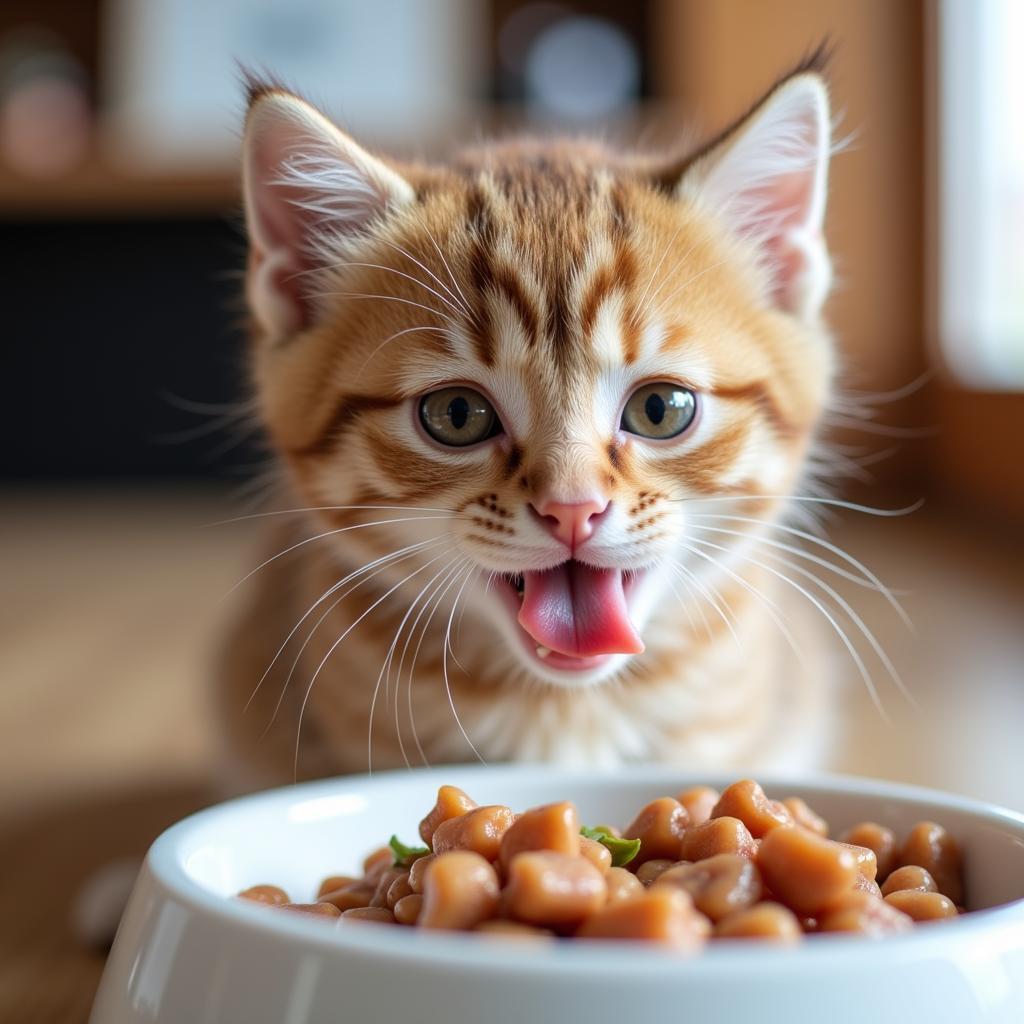Tuna. It’s a staple in many human diets, but what about for our feline friends, especially those just starting their life journey – kittens? Can kittens eat tuna? Is tuna good for kittens as a regular part of their diet? Let’s dive into the world of Tuna Kitten Food and explore the answers to these questions and more.
Can Kittens Eat Tuna?
The short answer is yes, kittens can eat tuna, but there are some important caveats. While tuna isn’t inherently toxic to kittens, it shouldn’t be a primary food source. Think of it like a tasty treat or a complement to their regular, balanced kitten food.
 Kitten Enjoying Tuna Treat
Kitten Enjoying Tuna Treat
Why Tuna Shouldn’t Be a Diet Staple for Kittens
While the occasional tuna morsel might seem harmless, here’s why you should exercise caution with making it a regular part of your kitten’s diet:
- Mercury Levels: Like many fish, tuna can accumulate mercury, a heavy metal that can be harmful to cats, especially growing kittens.
- Nutritional Deficiency: Kittens have specific nutritional needs that tuna alone can’t meet. They need a balanced diet specifically formulated for their growth and development, something tuna lacks.
- Thiamine Deficiency: Feeding your kitten too much tuna can lead to a thiamine (vitamin B1) deficiency. Thiamine is crucial for a cat’s nervous system and metabolism.
- Picky Eaters: Tuna has a strong taste that kittens can become fixated on, leading to them refusing other foods, including their balanced kitten food.
Choosing the Right Tuna for Your Kitten
If you decide to give your kitten tuna, moderation and the right type are key. Here’s what you should consider:
- Tuna Packed in Water vs. Oil: Always opt for tuna packed in water. Tuna in oil adds unnecessary fat and calories to your kitten’s diet.
- Fresh vs. Canned: Fresh tuna is preferable to canned as it’s less likely to contain high levels of mercury. However, if choosing canned, ensure it’s specifically labeled as safe for cats.
- Plain Tuna is Best: Avoid tuna with added flavors, spices, or seasonings, as these can be harmful to your kitten.
How to Safely Feed Tuna to Your Kitten
If you’re wondering how to incorporate tuna into your kitten’s diet safely, here are some tips:
- Small Quantities: Offer a tiny amount of tuna as an occasional treat. A teaspoon or less is a good starting point.
- Mix with Kitten Food: Combine the tuna with your kitten’s regular wet food to entice them to eat and add flavor.
- Monitor for Reactions: Always introduce new foods gradually and observe your kitten for any adverse reactions, such as vomiting or diarrhea.
- Consult Your Vet: If you have concerns about your kitten’s diet or how much tuna is safe, don’t hesitate to speak with your veterinarian.
FAQs About Tuna and Kittens
Here are some answers to commonly asked questions about feeding tuna to kittens:
Q: Can I give my kitten tuna every day?
A: No, it’s not recommended to feed tuna to your kitten daily. Tuna should only be given as an occasional treat.
Q: What are the signs of mercury poisoning in kittens?
A: Signs of mercury poisoning in kittens can include loss of coordination, tremors, blindness, and behavioral changes. If you notice any of these signs, contact your veterinarian immediately.
Q: What are some healthy alternatives to tuna for kittens?
A: Some healthy and safe alternatives to tuna for kittens include cooked chicken, turkey, or fish like salmon (ensure all bones are removed).
Conclusion
While the occasional taste of tuna can be a treat for your kitten, it’s crucial to remember that it should never replace a balanced diet formulated for their specific needs. By following the guidelines outlined above and working closely with your veterinarian, you can ensure your kitten enjoys a long, healthy, and delicious life.
Remember, a healthy kitten is a happy kitten!
Need more advice on the best food for your German Shepherd Husky mix? Check out our comprehensive guide: best dog food for german shepherd husky mix
Need immediate assistance? Contact our 24/7 customer support team:
- Phone: 02437655121
- Email: [email protected]
- Address: 3PGH+8R9, ĐT70A, thôn Trung, Bắc Từ Liêm, Hà Nội, Việt Nam.